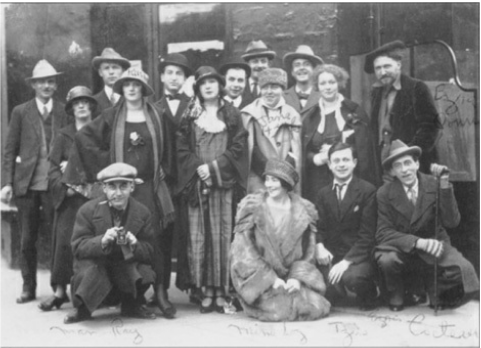

Wife Dorothy Shakespear Pound, Partner Olga Rudge
Queer Places:
Hamilton College, 198 College Hill Rd, Clinton, NY 13323, Stati Uniti
University of Pennsylvania (Ivy League), 3355 Woodland Walk, Philadelphia, PA 19104
10 Kensington Church Walk, Kensington, London W8 4NB, Regno Unito
Lungomare Vittorio Veneto, 30, 16035 Rapallo GE
252 Calle Querini, 30122 Venezia VE
Brunnenburg, Ezra Pound Weg 3, 39019 Tirolo BZ
Isola di San Michele, 30135 Venezia VE, Italia
_-_Ezra_Pound_-_Frontispiece.jpg) Ezra
Weston Loomis Pound (30 October 1885 – 1 November 1972) was an expatriate
American poet and critic, and a major figure in the early modernist poetry
movement. Identified with the Lost
Generation. His contribution to poetry began with his development of Imagism, a
movement derived from classical Chinese and Japanese poetry, stressing
clarity, precision and economy of language. His works include Ripostes
(1912), Hugh Selwyn Mauberley (1920) and the unfinished 120-section
epic, The Cantos (1917–1969).
Ezra
Weston Loomis Pound (30 October 1885 – 1 November 1972) was an expatriate
American poet and critic, and a major figure in the early modernist poetry
movement. Identified with the Lost
Generation. His contribution to poetry began with his development of Imagism, a
movement derived from classical Chinese and Japanese poetry, stressing
clarity, precision and economy of language. His works include Ripostes
(1912), Hugh Selwyn Mauberley (1920) and the unfinished 120-section
epic, The Cantos (1917–1969).
Pound worked in London during the early 20th century as foreign editor of several American literary magazines, and helped discover and shape the work of contemporaries such as T. S. Eliot, James Joyce, Robert Frost and Ernest Hemingway.[a] Angered by the carnage of World War I, Pound lost faith in Great Britain and blamed the war on usury and international capitalism. He moved to Italy in 1924 and throughout the 1930s and 1940s embraced Benito Mussolini's fascism, expressed support for Adolf Hitler, and wrote for publications owned by the British fascist Sir Oswald Mosley. During World War II, he was paid by the Italian government to make hundreds of radio broadcasts criticizing the United States, Franklin D. Roosevelt and Jews, as a result of which he was arrested in 1945 by American forces in Italy on charges of treason. He spent months in detention in a U.S. military camp in Pisa, including three weeks in a 6-by-6-foot (1.8 by 1.8 m) outdoor steel cage, which he said triggered a mental breakdown: "when the raft broke and the waters went over me". The following year he was deemed unfit to stand trial, and incarcerated in St. Elizabeths psychiatric hospital in Washington, D.C., for over 12 years.[2]
Pound began work on sections of The Cantos while in custody in Italy. These parts were published as The Pisan Cantos (1948), for which he was awarded the Bollingen Prize in 1949 by the Library of Congress, leading to enormous controversy. Largely due to a campaign by his fellow writers, he was released from St. Elizabeths in 1958 and returned to live in Italy until his death. His political views ensure that his work remains as controversial now as it was during his lifetime; in 1933 Time magazine called him "a cat that walks by himself, tenaciously unhousebroken and very unsafe for children". Hemingway wrote: "The best of Pound's writing—and it is in the Cantos—will last as long as there is any literature."[3]

Margaret Anderson and Jane Heap, middle standing; Ezra Pound, right
standing; Man Ray, with camera; Mina Loy, front center; Tristan Tzara, to her
right; and Jean Cocteau, with cane; in Paris
With the single exception of his long friendship with Natalie Barney, who provided him some financial support over the years, it was impossible for Pound to maintain relationships with homosexual women. Both editors of the Little Review were lesbian; although for a while Margaret Anderson allowed Pound’s enthusiasms to direct the journal, when they later met in Paris, she found him high-strung, agitated, and “over-elaborate” in his attitude toward women. Irritated at the way he treated women and the extent to which he used the Little Review to aggrandize himself, she dropped him from the masthead the following year. Writing to Solita Solano on 11 November 1972, Anderson said, “I wish, when critics write of me, they would mention what Ezra said: ‘No editor in America, save Margaret Anderson, even felt the need of, or responsibility for, getting the best writers concentrated—i.e., brought them together—in an American periodical.’ It was Ezra who influenced me to publish ‘Ulysses’—he simply sent the manuscript. I published it because I loved the ‘Portrait of the Artist’ and because of the magic words in the first chapter of ‘Ulysses.’”
My published books: